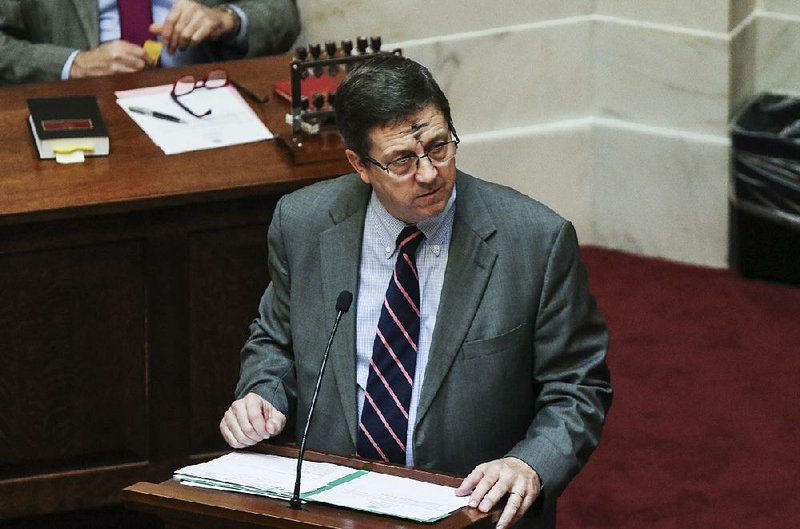With no votes to spare, the Arkansas Senate on Wednesday approved a measure authorizing the use of $8.15 billion in state and federal funds for the Department of Human Services' Division of Medical Services.
The bill includes spending authority for Arkansas' version of Medicaid expansion, which is called Arkansas Works and provides health insurance coverage.
The Senate voted 27-4 to approve Senate Bill 99 by the Joint Budget Committee shortly before a federal judge struck down the work requirements for the Medicaid expansion programs in Arkansas and Kentucky.
SB99 is the appropriation measure that grants spending authority for the Division of Medical Services in fiscal 2020, which begins July 1. Under Act 241 of 2018, the division is authorized the use of $8.2 billion in state and federal funds.
Republican Sens. Bob Ballinger of Hindsville, Trent Garner of El Dorado, Kim Hammer of Benton and Gary Stubblefield of Branch voted against the bill.
The measure required at least 27 votes for approval in the 35-member Senate. It requires 75 votes for approval in the 100-member House. The three-fourths vote requirement often has been a difficult threshold to meet for the Medicaid expansion program, which was first authorized by the Republican-controlled Legislature in 2013.
[RELATED: Complete Democrat-Gazette coverage of the Arkansas Legislature]
The action came a day after the Joint Budget Committee recommended approval. The committee's co-chairmen -- Sen. Larry Teague, D-Nashville, and Rep. Lane Jean, R-Magnolia -- acknowledged that lawmakers were trying to get the appropriation approved by both chambers before the federal judge ruled.
Ballinger told senators that if a federal judge ruled against the work requirement, "my hope is we will appeal it and we'll win at the U.S. Supreme Court and then we'll keep the work requirement.
"We need to stop. We don't need to move this [appropriation] forward. We need to figure out a direction," he said.
"What it seems to be to me is that we are so fearful of the fight, and I understand that we want to push this out now and to me that seems like that is just a mistake," Ballinger said. He said he's involved in "a little bit of a fight" with the department over funding for assisted living facilities.
Senate President Pro Tempore Jim Hendren, R-Sulphur Springs, noted that Wednesday was the 73rd day of this year's regular session.
"We are going to be done in about 10 or 11 more days this session and, if there is a time ... to pass [this] appropriation, it is now," he said.
Most of the people on the Medicaid expansion program are working, "so there is a segment that is not, but the problem is they are either working at places with no insurance or they are working and literally can't afford it," Hendren said.
"I think one of the biggest mistakes we've made the last six years is this continued effort to change policy through appropriations," he said. "That is just not the way the appropriation process is supposed to work.
"But if we continue this trend, are we going to block the Department of Education's budget because we don't like some policies that the schools are doing? Are we going to block [the Higher Education Department appropriation] because we don't like some things that are going on at campuses?
"So I think it is important that we get to what we are doing here, which is we are funding our responsibilities, and one of our fundamental responsibilities is the Medicaid budget, so I hope you would set aside some of the disagreement you had about policy and ... pass this appropriation," Hendren said.
In November, Gov. Asa Hutchinson proposed a $61.6 million increase, to $1.3 billion, in fiscal 2020 for the Department of Human Services' overall Medicaid general revenue budget. The department obtains the rest of the funding from the federal government.
In fiscal 2020, the state's share of the Medicaid expansion program is projected at $177 million, with the federal government's share at $1.91 billion.
A Section on 03/28/2019

